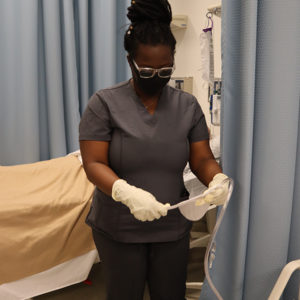
 Compassionate care in nursing involves recognizing, understanding, and empathizing with another person’s distress, suffering, and concerns. Patients and the family often experience emotional and physical distress during hospital visits.
Compassionate care in nursing involves recognizing, understanding, and empathizing with another person’s distress, suffering, and concerns. Patients and the family often experience emotional and physical distress during hospital visits.
Therefore, it’s the nurse’s responsibility to understand the patient, reassure and help them or their families as needed.
If you’re wondering how nurses can show compassion, this article digs deep into that. But first, let’s understand the general responsibilities of a nurse.
Responsibilities of a Nurse
A nurse’s responsibility varies depending on where they work and their license. However, here are seven general duties of nurses.
- Administering treatments and medication to patients
- Conducting diagnostic tests on patients
- Monitoring patient’s health and recording progress
- Performing physical examinations
- Giving support and advice to patients
- Providing counseling and enlightening patients on how to manage their health
- Providing basic care to patients in collaboration with other healthcare professionals
Five Ways a Nurse Can be More Compassionate 
The importance of compassion in healthcare cannot be stressed enough. Nurses must practice this to improve patient care and job performance.
Let’s discuss how Nurses can show compassion.
Showing Interest
Showing you’re concerned about the patient’s life beyond the medical concerns is one way to show compassion.
You can inquire about the patient’s personal life, how their family is doing, what they enjoy, and their favorite foods and TV shows. This makes it easier for patients to open up to you if they have any concerns or problems.
You don’t need to know every detail about the patient’s life. Just the day-to-day life issues. It makes them feel seen and valued.
Small talk about the patient’s life can help them relax before or after a major medical treatment, such as surgery.
Acknowledging the Patient’s Feelings
Being hospitalized is tough for anyone. Patients go through a lot of emotional turmoil while wondering if they’ll be okay. Your goal is to acknowledge their feelings and help them as they go through treatment.
For instance, you can use terms such as “I understand” instead of “I know”. Similarly, apologize for delayed medications even if you weren’t responsible for the delay.
If a patient says they’re uncomfortable about going to the washroom alone, be kind enough to accompany them.
Learning How to Be Empathetic
Empathy is understanding and relating to another person’s problems and emotions. In other words, empathy is “putting yourself in someone else’s shoes.”
It may be uncomfortable because you may feel unsure about this form of care, but it’s the best way to develop a strong nurse-patient relationship. This reassures the patient that they are not alone in experiencing such situations, giving them hope for a better tomorrow.
Being Patient
It can be very frustrating when you’ve had a long day at work but still receive late-night calls from your patient’s room. This is because you are tired and need to rest as well.
This can make you feel overwhelmed, and you may react negatively toward your patient. In such cases, keep your cool and pay attention to the tone of your voice because patients notice.
Remember that the patient does not want to be there as well. So be gentle and provide the patient with the required assistance and support.
Being Compassionate to Yourself
It’s impossible to pour from an empty cup. Therefore, you need to take care of yourself first. Compassion fatigue is real, and it can affect you if you don’t get enough rest and take care of your mental health.
Some ways to be compassionate to yourself include treating yourself well on your off days, such as going to the spa, eating out, or taking a staycation.
Getting enough sleep and eating well is also another way of being compassionate to yourself. This provides the brain with what it needs to cope with stress.
Lastly, get a hobby that helps you escape reality, such as biking, writing poems, or painting.
Get Trained by Professionals
Nursing is a rewarding career if you enjoy helping other people. And what better way to start your Nursing career than getting trained by professionals!
We at FVI have an (ASN) Associate of Science in Nursing program in Florida designed to develop student skills, knowledge, and competencies as they progress through the degree plan.
Contact us today or apply now to join our nursing program in Miami or our nursing program in Miramar.









